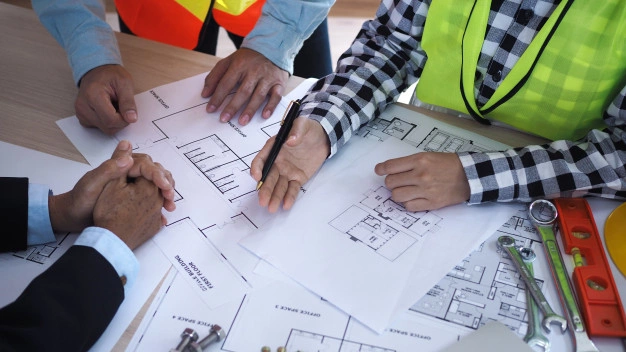The officer-in-charge (OIC) is the principal official within the construction company who is responsible for construction operations. He or she generally signs the construction contract and is the individual to whom the client turns in the event of any problems with the project manager. The OIC may also be the vice president for operations, chief operations officer (COO), district manager, senior PM, or may be the construction company owner or chief executive officer.

In the case of a small contractor, these may all be the same person who may also be the PM and superintendent as discussed in some of our later examples.
The chief financial officer (CFO) is often an equity partner within the construction firm. This individual is responsible for all of the accounting operations of the company including taxes, accounts payable, accounts receivable, and internal financial statements including the balance sheet and income statement. The general contractor’s CFO often communicates direct with the Internal Revenue Service, the client’s CFO, and the CFOs of the subcontractors as well. The CFO may also be involved with running the contractor’s independent equipment rental operations or real estate development arms if applicable. These concepts are introduced later in the book.
The CFO may have other titles including bookkeeper, accountant, finance manager, and others depending upon the size of the company.
The project manager reports to the officer-in-charge and has overall responsibility for completing the project in conformance with all contract requirements; this is typical for the general contractor, project owner, designers, and subcontractor PMs as well. He or she organizes and manages the contractor’s project team. The focus of this book will be on the functions of the GC’s PM in conjunction with the jobsite cost accountant.
Specific responsibilities of the PM include:
- Coordinating and participating in the development of the project budget and schedule;
- Developing a strategy for executing the project in terms of what work to subcontract;
- Negotiating and finalizing contract change orders with the owner and subcontractors;
- Submitting monthly progress payment requests to the owner;
- Managing financial close-out activities, and others.
The superintendent is responsible for the direct daily supervision of construction field activities on the project, whether the work is performed by the contractor’s direct raftsmen or those employed by subcontractors. On larger projects this is delegated to and accomplished by last planners, or those directly responsible for the work, such as assistant superintendents and/or foremen.
Specific general contractor superintendent responsibilities include:
- Planning, scheduling, and coordinating the daily activities of all craftspeople working on the site
- Determining the building methods and work strategies for construction operations performed by the contractor’s own work force (means and methods)
- Ensuring all work performed conforms to contract requirements
- Ensuring all construction activities are conducted safely, and others.
Project engineers or field engineers (PEs or FEs) typically report to the project manager and are responsible for coordinating daily details relating to field construction and documentation. On small projects, the PE’s responsibilities may be performed by the PM. On large projects there may be multiple PEs. Specific PE responsibilities include: processing submittals and requests for information and maintaining associated tracking logs; preparing contract documents and correspondence and maintaining the contract file; and reviewing subcontractor invoices and requests for payment. If the project is of sufficient size or remotely located or of a contract nature which warrants a jobsite cost accountant or cost engineer, that person will have similar responsibilities and background as the project engineer, and may be called a project engineer, but with primarily a cost focus. The cost accountant is located on the jobsite for the hotel case study and exercises utilized throughout this book. The jobsite cost accountant will work closely with the project manager to record costs, prepare monthly pay requests, and forecast future expenditures. The jobsite cost accountant will also work closely with the superintendent and help prepare cost control work packages, amongst other financial responsibilities.
Foremen are last planners who report directly to the superintendent and are responsible for the daily direct supervision of craftsmen on the project. The construction firm will assign foremen for work that is performed by the company’s own construction craftsmen. Foremen for all subcontracted work will be assigned by each subcontractor. Specific responsibilities include: coordinating the layout and execution of individual trade work on the project site; verifying that all required tools, equipment, and materials are available before work commences; and preparing daily or weekly time sheets for their crews.
